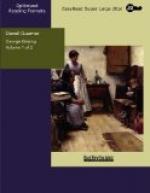“If you are astounded,” returned the other, raising his eyebrows, “I certainly am no less so. As your nephew made note of these lendings, wasn’t he equally careful to jot down a memorandum when the debt was discharged?”
Mr. Charnock regarded him fixedly, and for a moment seemed in doubt.
“You paid back these sums?”
“With what kind of action did you credit me?” said Glazzard, quietly.
The other hesitated, but wore no less stern a look.
“I am obliged to declare, Mr. Glazzard, that I can’t trust your word. That’s a very strong thing to have to say to a man such as I have thought you—a man of whom Harry always spoke as if there wasn’t his like on earth. My acquaintance with you is very slight; I know very little indeed about you, except what Harry told me. But the man who could deliberately borrow hundreds of pounds from a lad only just of age—a simple, trustful, good-natured country lad, who had little but his own exertions to depend upon—such a man will tell a lie to screen himself! This money was not paid back; there isn’t a word about it in the diary, and there’s the fact that Harry had got rid of his money in a way no one could explain. You had it, and you have kept it, sir!”
Glazzard let his eyes stray about the room. He uncrossed his legs, tapped on the arm of his easy-chair, and said at length:
“I have no liking for violence, and I shall try to keep my temper. Please to tell me the date of the last entry in that journal.”
Mr. Charnock opened the book again, and replied at once:
“June 5th of this year—1879.”
“I see. Allow me a moment.” He unlocked a drawer in a writing-table, and referred to some paper. “On the 1st of June—we were together the whole day—I paid your nephew five hundred and fifty pounds in bank-notes. Please refer to the diary.”
“You were together on that day, but there is no note of such a transaction. ’With E. G. Much talk about pictures, books, and music —delightful!’ That’s all.”
“Have you added up the sums mentioned previously?”
“Yes. They come to what you say. How did it happen, Mr. Glazzard, that you had so large a sum in bank-notes? It isn’t usual.”
“It is not unheard of, Mr. Charnock, with men who sometimes play for money.”
“What! Then you mean to tell me that Harry learnt from you to be a gambler?”
“Certainly not. He never had the least suspicion that I played.”
“And pray, what became of those notes after he received them?”
“I have no idea. For anything I know, you may still find the money.”
Mr. Charnock rose from his seat.
“I see,” he said, “that we needn’t talk any longer. I don’t believe your story, and there’s an end of it. The fact of your borrowing was utterly disgraceful; it shows me that the poor boy had fallen in a trap, instead of meeting with a friend who was likely to guide and improve him. You confess yourself a gambler, and I go away with the conviction that you are something yet worse.”




